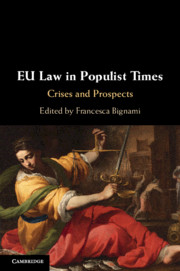Book contents
- EU Law in Populist Times
- EU Law in Populist Times
- Copyright page
- Contents
- Notes on Contributors
- Preface
- Introduction
- I Economic Policy
- II Human Migration
- III Internal Security
- 10 The EU and International Terrorism
- 11 The Preventive Turn in European Security Policy
- 12 The Opening Salvo
- 13 Preserving Article 8 in Times of Crisis
- 14 Progress and Failure in the Area of Freedom, Security, and Justice
- IV Constitutional Fundamentals
- Conclusion
- Index
13 - Preserving Article 8 in Times of Crisis
Constraining Derogations from the European Convention on Human Rights
from III - Internal Security
Published online by Cambridge University Press: 05 December 2019
- EU Law in Populist Times
- EU Law in Populist Times
- Copyright page
- Contents
- Notes on Contributors
- Preface
- Introduction
- I Economic Policy
- II Human Migration
- III Internal Security
- 10 The EU and International Terrorism
- 11 The Preventive Turn in European Security Policy
- 12 The Opening Salvo
- 13 Preserving Article 8 in Times of Crisis
- 14 Progress and Failure in the Area of Freedom, Security, and Justice
- IV Constitutional Fundamentals
- Conclusion
- Index
Summary
The European Convention on Human Rights (ECHR) has been enormously influential among international instruments in defining and defending individual rights around the world. Article 8, in particular, is the most widely recognized source of legal authority for privacy as a claim of fundamental rights.1 However, even under ideal conditions these values are maintained only with “eternal vigilance,” as the truism states. Especially in times of emergency, states are under pressure to constrict rights enshrined in international instruments and domestic law. One attempt to sustain rights through times of crisis is Article 15 of the ECHR, which permits some derogation of human rights as an extraordinary measure. The Convention provides for derogation only where the very “life of the nation” is under threat, the response strictly limited, and as consistent with other obligations under international law. In this way, the European Convention allows for limited state deviation from established international norms; by providing for the conditional and supervised derogation from their obligations under the Convention,2 Article 15 recognizes state needs while incentivizing states not to abandon the commitment to defend rights. In total, nine states have relied on Article 15 since the Convention was established – Ukraine, Albania, Armenia, France, Georgia, Greece, Ireland, Turkey, and the United Kingdom.3 France and Turkey most recently called states of emergency.4
- Type
- Chapter
- Information
- EU Law in Populist TimesCrises and Prospects, pp. 342 - 374Publisher: Cambridge University PressPrint publication year: 2020

